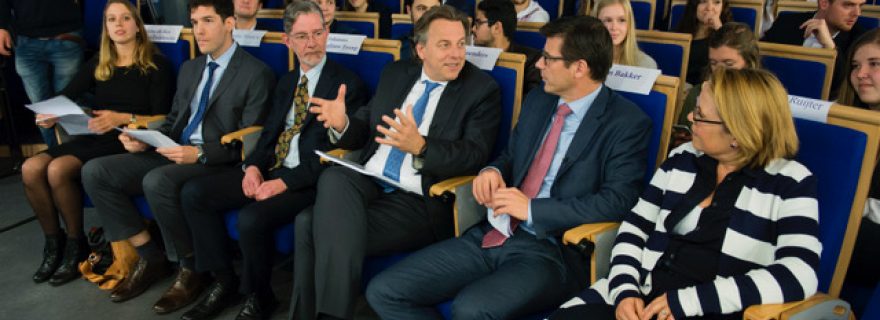Minister Koenders visits Leiden University - speech by one of our students
On November 17, Dutch Minister of Foreign Affairs Bert Koenders visited Leiden University to speak about international security threats. One of Leiden University's students also shared his vision on current security issues.
On November 17, Dutch Minister of Foreign Affairs Bert Koenders visited Leiden University - the Faculty of Governance and Global Affairs in The Hague to speak about international security threats. In front of about 200 students, he stressed the need for better cooperation in light of a number of developments, such as the Brexit, Trump's election, the migration crisis and the threat of terrorism.
After the speech by Koenders, one of Leiden University's students - Aleksander Maricic who is studying the master's programme Crisis and Security Management - set out his vision on international security threats.
Below our some excerpts of Maricic's speech:
There can be no doubt that the security situation has degraded rapidly over the last few years. Several European states have found themselves the victim of ambitious and effective terrorist attacks. A wave of immigration has flooded the continent putting strain on the Schengen agreement. It has also taken a toll on both the political and social climate of European countries. These issues are compounded by the unexpected British vote to leave the EU which has shaken the concept of the Union itself, making previous concerns over Greece’s exit seem quaint by comparison. Finally, the outcome of the American election - the victory of a candidate whose intentions are essentially unknown but whose political positions significantly differ from the European norm has introduced uncertainties regarding the future of USA-EU relations.
Yet, I firmly believe that these challenges can be overcome and potentially steered in a positive direction.
To that end I would like to present two approaches that, in my opinion, would benefit both Dutch and European security.
The first includes maintenance of the transatlantic link and the continued importance of NATO as well as the unique role of the Netherlands in this process. It is not an exaggeration to claim that a smooth relationship between the EU and the United States is critical to the overall security of the continent. The importance of the Dutch as a link between the two is particularly well conveyed by the former US Ambassador to the Netherlands, Clifford Sobel: “With the EU divided and its direction uncertain, the Dutch serve as a vital transatlantic anchor in Europe… As a founding member of NATO…and Britain's strongest ally on continent, the Dutch are an influential voice in Europe” and the “go-to guys” for resolving potential EU-NATO conflicts.
After the British vote to leave the Union, this role can only gain in significance. The reason for this is that the UK’s “special relationship” with the US presented one of the key avenues for American influence within the EU. Therefore the inevitable outcome of Brexit will be a diminishing of that influence. As perhaps the closest remaining ally of these two countries, The Netherlands is uniquely positioned to take advantage of the situation and provide them a voice in EU institutions. For the same reasons the Dutch role as an intermediary between NATO and the Union will become even more important in the coming period.
The second approach is somewhat different. It looks toward enhancing the role of the EU as a provider of security. The often quoted description of the Union as an “economic giant, political dwarf and military worm” by former Belgian foreign minister Mark Eyskens is as true in 2016 as it was in 1991. The crises in Libya, Syria and Ukraine show that EU still falls far short of projecting the sort of political and military power its size and economy suggest. The EU project cannot deepen and grow without a joint defense and the resulting ability to actively pursue its interests through military (and political) means. With the worsening of the security situation an increase of the appeal of politics based on isolationism and nationalism is inevitable. The successes of those platforms in Britain and the US has provided credibility for their counterparts in the upcoming elections in France and the Netherlands. Even if they do not achieve their immediate goals we must recognize that the overall political discourse in Europe has irreversibly changed.
Thus the Union finds itself in need of a quantifiable success. A victory of sorts, that post-Brexit, and in the midst of unresolved domestic and foreign issues would reassert the value of unity. Deepening EU security arrangements is the way to achieve that goal. We have already seen some developments in this direction. In October, defense ministers of France, Germany, Italy and Spain proposed measures toward increased military coordination and the process they started seems likely to continue.
To conclude, I would like to address the question of the compatibility of these two approaches. They may seem contradictory – after all, how could the Netherlands support both the stability and cohesion of NATO as well as the transition of the EU to a military power, without one process eventually impinging on the other? I feel that this is a matter of political foresight and positioning, a balancing act between the two options – rather than a genuine obstacle. The key thing to keep in mind is that both approaches work towards increased security – whether it be through a strengthened NATO, a revitalized Union, or, ideally - both.
Professor Edwin Bakker also shared his views on the current security challenges during this afternoon. A report of the meeting including the text of the speech by Minister Koenders can be found here.


